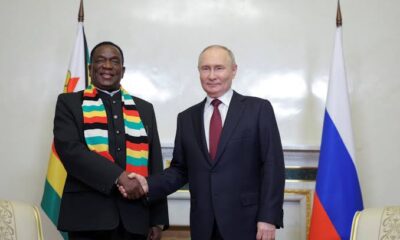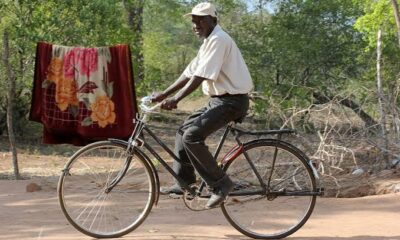Strictly Personal
The voice of the people is NOT the voice of God
Over the past seven months, ever since the military coup that ousted former Zimbabwe dictator Robert Gabriel Mugabe in November last year, the country has been inundated with several slogans and mantras meant to legitimise and justify those who took power – however, what is most painful is the use of blasphemy, through the abuse of God’s name for political expediency
Published
6 years agoon
Over the past seven months, ever since the military coup that ousted former Zimbabwe dictator Robert Gabriel Mugabe in November last year, the country has been inundated with several slogans and mantras meant to legitimise and justify those who took power – however, what is most painful is the use of blasphemy, through the abuse of God’s name for political expediency.
Although, Zimbabwe is, by far, not new to blasphemy by politicians – having witnessed the shameful comparison of Mugabe to our Lord Jesus Christ, and baseless claims by shadowy prophets that he had been specifically anointed by God to lead the nation, and no one was supposed to challenge him – but, the continued abuse of Jehovah’s name is worrying, to say the least.
Possibly, as a direct result of Mugabe’s claim that he was specifically appointed by God to lead this country – and that only He could remove him – those who ousted him have sought to justify their actions by insinuating that their actions were inspired by God.
Otherwise, how else can one explain the now all too familiar mantra claiming that, “the voice of the people is the voice of God”?
First of all, as every Zimbabwean knows, Mugabe was not removed by the people, but by the military, as he was held under house arrest, whilst being pushed to resign.
The call for people to go out onto the streets to call for his resignation was just a smokescreen for what was truly happening behind the scenes, in order to give impression of a popular uprising, so as to camouflage the military action – and, as in fact did happen, avoid international ramifications.
Let us not forget that the call for mass action came after the military had already intervened.
This, by any stretch of the imagination, can never be said to be the voice of God!
Secondly, even if we were to accept that what transpired last November was indeed a popular uprising, what justification is there to claim that this was the voice of God?
Since when has God spoken through popular or mass action?
As much as I am a firm believer in democracy and democratic values, we should separate these from the voice of God – as these are fundamentally divorced from each other.
God does not – and has never worked – through mass or popular action.
In fact, most acts of rebellion against God in the Bible were carried out through popular and mass action.
A couple of examples immediately come to mind – for instance, the mass call for God’s only begotten son Jesus Christ to be crucified – nearly everyone cried, “crucify Him!”.
That was not the voice of God.
Another example is when the children of Israel constantly demanded that they be returned to bondage in Egypt, whenever their plight in the wilderness became unbearable – even leading to them creating an idol for them to worship when Moses was up the mountain talking with God.
Furthermore, the children of Israel, later on, collectively demanded a human king from the prophet Samuel – an act that greatly pained God, as it was a direct rejection of His rule.
Several times, from that point onwards, the children of Israel – together as a mass – disobeyed God, as they made their own popular decisions that were not directed by Him.
It is, thus, clear that God never spoke through the people as a collective.
In fact, the true voice of God was always met with resistance from the people, as it was highly unpopular – and it came through His genuine prophets.
If ever there were to be Gallup polls in those days, the people with the lowest approval ratings would have been the genuine prophets of God – as the voice of the people was always contrary to that of God.
Even during the days of the apostles, the voice of God that they spoke of was seldom received well, as it was not the voice of the people – leading to widespread persecution and even death.
Similarly, today is not any different – as the voice of the people is surely not the voice of God.
The desires of humans are always mostly of the world and of the flesh, and are not necessarily of the Spirit and inspired by God.
Similarly, Zimbabweans’ heed to go onto the streets in November last year, was inspired more by long-term suffering and pain that they had endured under Mugabe, than an instruction from God.
There was never any genuine prophet of God who had come forward to lead the nation with a direct message from Him – as did Moses – in calling for Mugabe to “let His people go”.
What Zimbabwe, and the world over, lacks are genuine prophets of God – who are truly sent and speak His instructions.
As I have written so many times before, what we have today are mere soothsayers, predictors and healers – from whose power only themselves know – who are more like sangomas, rather than prophets of Jehovah God, who relay His messages.
They are better at predicting what is going to happen, or telling someone their phone numbers, and healing the sick, than actually transmitting messages from God.
The genuine prophets of God were instructed by Him to convey very important messages, and even to appoint leaders that He would have specifically chosen – whilst, at the same time keeping those leaders in check.
Which leaders, have our so-called prophets today, ever appointed as a direct instruction from God?
If the current leadership is truly from God, which prophet was sent to appoint and announce them?
Read Also: Is Anas The Bill Cosby Of Ghana?
I do not recall ever seeing or hearing of a prophet who was sent to announce to Mugabe that God had said that he should step down, and anointing a new leader – as did Samuel when he told Saul, whom he had anointed earlier on, that God had rejected him, after anointing David.
Even Father Fidelis Mukonori – who was heavily involved in the talks between the military and Mugabe leading to his resignation – at no point, did he ever claim that he had carried a message from God for Mugabe to step down, and Mnangagwa to take over – but, made it very clear that he was just one of the negotiators.
In fact, that is why the current leadership would rather hide behind “the voice of the people’” because God never sent any prophet to appoint them.
Predicting a future leader, or the death of a leader, is not prophecy from God, but mere soothsaying – just as a sangoma would do – but, God directly sends His prophets to be directly involved in the appointment of His chosen leader.
Genuine prophets rebuked and corrected those leaders whenever they went against God’s word, as did Samuel to Saul – when he disobeyed His instructions – and Nathaniel to David – after he had committed adultery with Uriah’s wife.
Similarly, other prophets as Elijah and Elisha were sent by God to rebuke and carry instructions to kings and the people – whose messages proven highly unpopular.
However, today we have populist prophets, who are after making as many powerful friends as possible, so as to freely make their millions of dollars from fleecing the people, and shoddy dealings.
They would rather sup with leaders, even when they are corrupt, or abusing and oppressing their own people.
Genuine prophets of God are not there to make friends, or please any section of society, but are strictly there to convey what Jehovah would have instructed them – most of which makes them more enemies than friends, especially from the ruling elite, and the general population, as most of us are prone to go against God’s Word.
If ever we witness a so-called prophet who says or does things that are meant to endear him or herself to a certain section of society, then they are not of God – as with biblical times, genuine prophets were more isolated and hated by nearly everyone.
Yet, these so-called prophets we have today seek favour from men (people), especially from those in power, or the general population – so that they may attend their churches and give them money.
Therefore, as much as leaders would want to be accepted by the people, or to win democratic elections, there can never be any justification to blasphemy against Jehovah – and it is such a shame that those who claim to be men and women of God never stand up against such acts.
The voice of the people is through the democratic process, but the voice of God is through His genuine prophets – and the two are very different.
As a relatively democratic country, Zimbabweans should campaign freely and peacefully – based purely on their policies and manifestoes – but, should never ever abuse the sacred name of God for their selfish political gains.
God is not against democracy, but let us pray for His blessings for our nation, without bringing His name into disrepute – as that will only spell further disaster for our nation.
Commentator: Tendai Ruben Mbofana.
He is the Programmes Director with the Zimbabwe Network for Social Justice (ZimJustice).
You may like
-


Production at China’s $1 billion Tsingshan steel mill in Zimbabwe begins
-


Zimbabwe: President Mnangagwa under fire for criticising Russia’s support for Zambia
-


Zimbabwean govt urges citizens to cycle to work amid fuel scarcity
-


Under govt pressure, Zimbabwean lithium miners present their refinery plans
-


Zimbabwe’s new gold-backed currency now official unit of exchange
-


Cricket: Bangladesh defeats Zimbabwe by nine wickets to seal T20 series
Strictly Personal
All eyes in Africa are on Kenya’s bid for a reset, By Joachim Buwembo
Published
5 days agoon
July 21, 2024
Whoever impregnated Angela Rayner and caused her to drop out of school at the tender age of 16 with no qualifications might be disappointed that we aren’t asking who her baba mtoto (child’s father) is; whether he became a president, king or a vagabond somewhere, since the girl ‘whose leg he broke’ is now UK’s second most powerful person, 28 years since he ‘stole her goat’.
Angela’s rise to such heights after the adversity should be a lesson to countries which, six decades after independence, still have millions of citizens wallowing in poverty and denied basic human dignity, while the elite shamelessly flaunt obscene luxury on their hungry, twisted faces.
After independence, African countries also suffered their adolescent setbacks in the form of military coups. Uganda’s military rule lasted eight years, Kenya’s about eight hours on August 1, 1982, while Tanzania’s didn’t materialise and its first defence chief became an ambassador somewhere.
What we learn from Angela Rayner is that when you’re derailed, it doesn’t matter who derailed you, because nobody wants to know. What matters is that you pick yourself up, not just to march on, but to stand up and shine.To incessantly blame our colonial and slave-trading ‘derailers’ while we treat our fellow citizens worse than the colonialists did only invites the world to laugh. Have you ever read of a colonial officer demanding a bribe from a local before providing the service due?
African countries today need to press ‘reset’. A state operates by written policies, plans, strategies and prescribed penalties with gazetted prisons for those who break the rules. This is far more power than teenage Angela had, so a reset state should take less time to become prosperous than the 28 years it took her to get to the top after derailing.
So it’s realistic for countries to operate on five-year planning and electoral cycles, so a state that fails to implement a programme in five years has something wrong with it. It needs a reset.
A basic reset course for African leaders and economists should include:
1. Mindset change: Albert Einstein teaches us that no problem can be solved from the same level of consciousness that created it. For example, if you are in debt, seeking or accepting more debt is using the same level of thinking that put you there. If you don’t like Einstein’s genius, you can even try an animal in the bush that falls into a hole and stops digging. Our economists are certainly better than a beast in the bush.
2. Stealing is wrong: African leaders and civil servants need to revisit their catechism or madarasa – stealing public resources is as immoral as rape.
3. Justifying wrong doesn’t make it right: Using legalese and putting sinful benefits in the budget is immoral and can incite the deprived to destroy everything.
4. Take inventory of your resources and plan to use them: If Kenya, for example, has a railway line running from Mombasa to Nairobi, is it prudent to borrow $3.6 billion to build a highway parallel to it before paying off and electrifying the railway?
If Uganda is groaning under a $2 billion annual petrol import bill, does it make sense to beg Kenya for access to import more fuel, when Kampala is already manufacturing and marketing electric buses, while failing to use hundreds of megawatts it generates, yet the country has to pay for the unused power?
If Tanzania… okay, TZ has entered the 21st Century with its electric trains soon to be operating between Dar es Salaam and Morogoro. Ethiopia, too, has connected Addis Ababa to the port of Djibouti with a 753-kilometre electric railway, and moves hundreds of thousands of passengers in Addis every day by electric train.
5. Protect the environment: We don’t own it, we borrowed it from our parents to preserve it for our children. Who doesn’t know that the future of the planet is at stake?
6. Do monitoring and evaluation: Otherwise you may keep doing the same thing that does not work and hope for better results, as a sage defined lunacy.
7. Don’t blame the victims of your incompetence: This is basic fairness.
We could go on, but how boring! Who doesn’t know these mundane points? We are not holding our breath for Angela’s performance, because if she fails, she will be easily replaced. Africa’s eyes should now be on Kenya to see how they manage an abrupt change without the mass bloodshed that often accompanies revolutions.
Strictly Personal
The post-budget crisis in Kenya might be good for Africa, after all, By Joachim Buwembo
Published
2 weeks agoon
July 10, 2024
The surging crisis that is being witnessed in Kenya could end up being a good thing for Africa if the regional leaders could step back and examine the situation clinically with cool-headed interest. Maybe there is a hand of God in the whole affair. For, how do explain the flare not having started in harder-pressed countries such as Zambia, Mozambique and Ghana?
As fate would have it, it happened in East Africa, the region that is supposed to provide the next leadership of the African Union Commission, in a process that is about to start. And, what is the most serious crisis looming on Africa’s horizon? It is Debt of course.
Even the UN has warned the entire world that Africa’s debt situation is now a crisis. As at now, three or four countries are not facing debt trouble — and that is only for now.
There is one country, though, that is virtually debt-free, having just been freed from debt due to circumstances: Somalia. And it is the newest member of the East African Community. Somalia has recently had virtually all its foreign debt written off in recognition of the challenges it has been facing in nearly four decades.
Why is this important? Because debt is the choicest weapon of neocolonialists. There is no sweeter way to steal wealth than to have its owners deliver it to you, begging you, on all fours, to take it away from them, as you quietly thank the devil, who has impaired their judgement to think that you are their saviour.
So?
So, the economic integration Africa has embarked on will, over the next five or so years, go through are a make-or-break stage, and it must be led by a member that is debt-free. For, there is no surer weapon to subjugate and control a society than through debt.
A government or a country’s political leadership can talk tough and big until their creditor whispers something then the lion suddenly becomes a sheep. Positions agreed on earlier with comrades are sheepishly abandoned. Scheduled official trips get inexplicably cancelled.
Debt is that bad. In African capitals, presidents have received calls from Washington, Paris or London to cancel trips and they did, so because of debt vulnerability.
In our villages, men have lost wives to guys they hate most because of debt. At the state level, governments have lost command over their own institutions because of debt. The management of Africa’s economic transition, as may be agreed upon jointly by the continental leaders, needs to be implemented by a member without crippling foreign debt so they do not get instructions from elsewhere.
The other related threat to African states is armed conflict, often internal and not interstate. Somalia has been going through this for decades and it is to the credit of African intervention that statehood was restored to the country.
This is the biggest prize Africa has won since it defeated colonialism in (mostly) the 1960s decade. The product is the new Somalia and, to restore all other countries’ hope, the newly restored state should play a lead role in spreading stability and confidence across Africa.
One day, South Sudan, too, should qualify to play a lead role on the continent.
What has been happening in Kenya can happen in any other African country. And it can be worse. We have seen once promising countries with strong economies and armies, such as Libya, being ravaged into near-Stone Age in a very short time. Angry, youthful energy can be destructive, and opportunistic neocolonialists can make it inadvertently facilitate their intentions.
Containing prolonged or repetitive civil uprisings can be economically draining, both directly in deploying security forces and also by paralysing economic activity.
African countries also need to become one another’s economic insurance. By jointly managing trade routes with their transport infrastructure, energy sources and electricity distribution grids, and generally pursuing coordinated industrialisation strategies in observance of regional and national comparative advantages, they will sooner than later reduce insecurity, even as the borders remain porous.
EDITOR’S PICK


Trevor Noah set for ‘Off the Record’ world tour
South African comedian and talk show host, Trevor Noah, has announced a date for his “Off The Record” global tour...


SA mobility startup LULA acquires UK-based Zeelo’s operations
South Africa’s mobility startup, LULA, has announced the acquisition of the operations of UK-based Zeelo in a move that will...


Ngannou accuses Joshua of employing dirty tactics in their fight in Saudi Arabia
Former UFC heavyweight champion, Francis Ngannou, has accused British-Nigerian boxer, Anthony Joshua, and his promotion team of employing unfair and...


#EndBadGovernance Protests: Please be patient with Tinubu’s govt, monarchs beg Nigerian youths
Some prominent traditional rulers in Nigeria have pleaded with Nigerian youths and organizers of the planned nationwide #EndBadGovernance protests scheduled...


UNESCO removes Senegal’s Niokolo-Koba National Park from list of World Heritage sites in danger
The United Nations’ Educational, Scientific and Cultural Organization (UNESCO) has removed Senegal’s Niokolo-Koba National Park from the list of World...


At Project Aliyense discourse, panelists call for balance between free speech, ethical considerations
The government has been urged to balance freedom of speech with ethical considerations and laws that prevent harm to others....


Adenia Partners acquires Air Liquide’s operations in 12 African countries
Adenia Partners, a leading private equity firm, has completed the acquisition of Air Liquide’s operations in 12 African countries, adopting...


We will handle planned nationwide protests as family matter— Nigerian Govt
The Nigerian government says it will handle the planned #EndBadGovernance protests scheduled to commence on August 1 as a family...


Veteran Nigerian entertainer Charly Boy vows to divorce wife if Kamala Harris doesn’t win US presidential election
Veteran Nigerian entertainer, Charles Oputa, popularly known as Charly Boy, has vowed to divorce his wife of 47 years if...


Saudi club Al Hilal places African transfer record bid for Osimhen
Saudi Arabia club side, Al-Hilal, have reportedly made an African transfer record bid for Super Eagles and Napoli striker, Victor...
Trending
-

 Sports1 day ago
Sports1 day agoMeet Nigerian-born players doing big things for Japan at Paris 2024 Olympics
-

 Metro2 days ago
Metro2 days agoWe will handle planned nationwide protests as family matter— Nigerian Govt
-

 Tech2 days ago
Tech2 days agoAdenia Partners acquires Air Liquide’s operations in 12 African countries
-

 Metro18 hours ago
Metro18 hours ago#EndBadGovernance Protests: Please be patient with Tinubu’s govt, monarchs beg Nigerian youths


